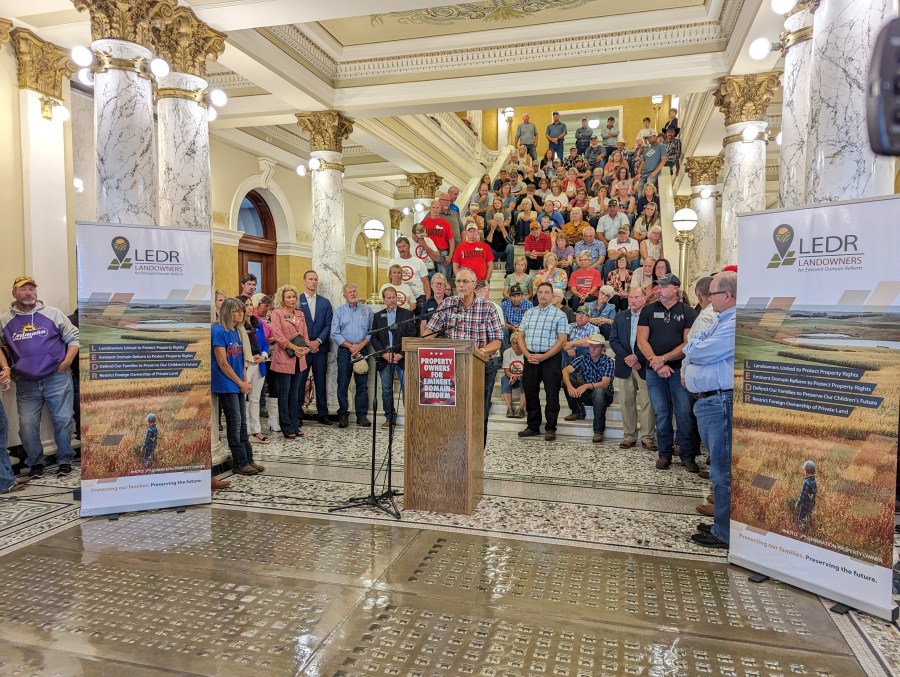PIERRE, S.D. (KELO) — The recent decision by a majority of South Dakota voters to stop SB201 from becoming state law means that carbon dioxide pipelines will be back as a top issue when the 2025 session of the Legislature opens in January.
Some opposition leaders hope that the 59% rejection can strengthen their arguments in the halls of the Capitol. They’ve already seen SB201 backfire against many of the state lawmakers who had voted for it, as challengers beat incumbents in Republican primaries and a near-sweep by opponents for Republican leadership spots.
“The outcome of the primary and general elections sends a clear message,” Republican Sen. Al Novstrup told KELOLAND News. “Voters rejected the CO2 pipeline because they saw it for what it is—a waste of taxpayer dollars, a safety risk, and a violation of landowners’ rights.
“This is a victory for those who believe taxpayer money should be spent wisely, and that safety and property rights should never be sacrificed for private gain,” Novstrup continued. “There will be a bill that says CO2 pipelines do not qualify for eminent domain.”
South Dakota has a chapter of laws allowing private land to be condemned, with a jury to determine compensation. In the 2023 session, freshman Republicans Karla Lems and John Sjaarda brought legislation trying to restrict some of that power, but their attempts were either defeated or withdrawn.
This year, eminent domain restrictions and private property protections were attempted by more of the House Republicans, such as Scott Moore, Scott Odenbach, Rocky Blare, Jon Hansen, Marty Overweg and Will Mortenson.
All of those efforts died at their first committee hearings or on the House floor, except for Mortenson’s HB1185 that laid out in much greater detail what was necessary from a project needing a permit from the state Public Utilities Commission. Mortenson’s measure passed both chambers and Governor Kristi Noem signed it into law. Likewise for his HB1186 that defines the requirements for granting a carbon pipeline easement.
Mortenson, the House Republican leader, was also one-half of the sponsorship team on SB201. Its prime sponsor was Senate Republican leader Casey Crabtree, who didn’t respond to a request for comment for this story. Both men were ousted from leadership by other Republicans, however, in caucus elections held a few days after the November 5 elections.
Odenbach defeated Mortenson, and Overweg was chosen as assistant House leader, while Jim Mehlhaff knocked out Crabtree. Hansen was nominated that night as the new House speaker, and Lems as speaker pro tem, with Chris Karr nominated as the new Senate pro tem. All of the new choices, other than Mehlhaff, had voted against SB201.
In 2023, the PUC had rejected CO2 pipeline applications from first Navigator and then Summit Carbon Solutions. On Tuesday, Summit applied a second time. The project would collect the CO2 that ethanol production plants now emit into the atmosphere and ship the gas to a site in North Dakota where it would be buried in the ground.
Mortenson told KELOLAND News that the pipeline issue has been frustrating.
“I don’t like the carbon pipeline using eminent domain and I don’t like counties enacting abusive regulations. Both hurt private property rights. I tried to bring a measure that provided for farmers, while cutting back on over-regulation, but it got lost in the politics, and that’s too bad. The Not-In-My-Back-Yard sentiment is strong with this pipeline,” Mortenson said.
“I doubt I will bring any legislation specific to the carbon pipeline this year,” he continued. “I am going to keep a close eye on any bills that would disrupt siting roads, electrical lines, and water lines. I’m worried the NIMBY crowd will throw the baby out with the bath water and remove our ability to have any new utilities in this state. So, I’ll be encouraging my colleagues to be careful and precise. I still want us to be a state that can build things.”
One of the new legislators in the 2025 session will be Republican Sen.-elect Joy Hohn, who promised in her campaign to “work to keep our land American-owned, controlled and protected.” She and her husband, Rod, fought against the Navigator pipeline.
In one of their emails to the PUC during that 2023 process, Joy Hohn wrote, “What is very upsetting to me is how private for-profit companies can just file an application (anyone can file an application), declare that they are a company (which is a routine process to incorporate), misuse our eminent domain laws and then take people’s land that has been in their family for generations. How can this happen in America? This is not what our forefathers envisioned for our country.”
Hohn, when asked last week by KELOLAND News what lesson she drew from the defeat of SB201, responded, “The people of South Dakota have spoken loud and clear against Referred Law 21 which would have paved the way for unprecedented change to South Dakota codified law and government overreach. It gives me great hope for the future of our state and our country that the people of South Dakota still stand for freedom and our foundational American constitutional rights.”
Asked whether she would submit any legislation in 2025, Hohn stated, “We have a lot of work to do in the next legislative session to enact necessary legislation that will protect personal property rights. We need laws that define and hold to the purpose of public benefit and limit the power of condemnation.
“It is the use of eminent domain with the approach of public benefit for potential future economic growth that we need to be cautious about,” she continued. “Eminent domain is a restricted authority, reserved for public use. The carbon dioxide pipeline can be built without eminent domain. We have to strive for a balance between the economy and our constitutional rights.”


